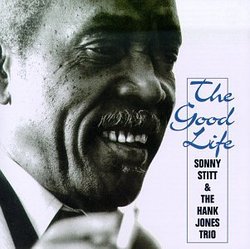| All Artists: Sonny Stitt, Hank Jones Title: Good Life Members Wishing: 1 Total Copies: 0 Label: Evidence Original Release Date: 1/1/1994 Re-Release Date: 4/1/1994 Genres: Jazz, Pop Style: Bebop Number of Discs: 1 SwapaCD Credits: 1 UPC: 730182208825 |
Search - Sonny Stitt, Hank Jones :: Good Life
 | Sonny Stitt, Hank Jones Good Life Genres: Jazz, Pop
|
Larger Image |
CD Details |
CD ReviewsThe Art Tatum of the Tenor Saxophone Does It Again! Samuel Chell | Kenosha,, WI United States | 05/16/2009 (5 out of 5 stars) "(I would have slipped alto into the title, but Sonny sticks to tenor on this date.) No saxophonist could do better by these tunes, though two of the songs are given over, without warning, to Grady Tate vocals. Sonny was always at his best with Hank Jones (dig "Sonny Stitt and the New Yorkers"--not to be confused with the equally impressive "New York Jazz," which has Jimmy Jones on piano). From Sonny's perspective, Art Tatum played "simple music" because he stuck to the melody and always tried to "please the people." Sonny's aesthetic and virtually "frightening" mastery of the horn (to him, it was "Art Tatum simple") attest to his kinship with the foremost pianist of them all. Even on the ballads--"As Time Goes By," "Polka Dots and Moonbeams," and the title song--the pyrotechniques are headspinning yet absolutely clean and precise, the notes played at furious speed yet individually articulated and always swinging, each phrase a complete story in itself, and with as gorgeous, embodied, clear and "uncluttered"-- simply put, exemplary--sound ever achieved on a saxophone (tenor or alto, the latter striking me as even closer to Stitt's most creative muse). The vocals of Grady Tate, while well done, are a needless "stretcher" on this date. I would rather have heard Sonny's rather than Grady's interpretation of "My Funny Valentine" and "Body and Soul." The latter tune, the most frequently recorded popular tune in the history of American popular music, is the Excalibur of every tenor saxophonist since Coleman Hawkins' 1939 version. Coltrane and Dexter Gordon pass the test with authority equivalent to Hawk's but Stitt's is no less definitive. Check out "New York Jazz," if anything a more essential Stitt album than "The Good Life." (For "My Funny Valentine," look for the rare album, "Sonny Stitt Plays the Arrangements of Quincy Jones.")
As a side note, the date is a bit of a curiosity, even after the explanation in All Music Guide. It appears to have been released initially (and recorded) by a Japanese company. The playing of Sonny argues for a date closer to 1960 than 1980, though the presence of drummer Tate seems to confirm it is, in fact, closer to the latter date. And the misspelling of "Deuces" (here it's "Duces") can probably be chalked up to Japanese unfamiliarity with the language or simply be seen as a paradox, given the perfection of the music. (If only the writing about Stitt came remotely close to the music, or to representing his unequaled achievement and significance as a great American Master of the art.)" |

 Track Listings (10) - Disc #1
Track Listings (10) - Disc #1